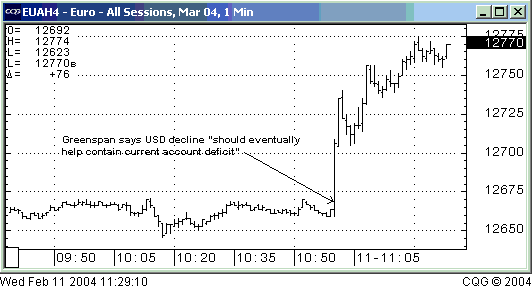
(I first heard a version of this expression a long time ago from another trader. It comes in handy from time to time.)
Some Chicago Boyz know each other from student days at the University of Chicago. Others are Chicago boys in spirit. The blog name is also intended as a good-humored gesture of admiration for distinguished Chicago School economists and fellow travelers.

(I first heard a version of this expression a long time ago from another trader. It comes in handy from time to time.)
Comments are closed.
This could be the beginning of a new genre on the blog : “drop-the-soap opera”. (First heard of that one from someone talking about Oz on HBO).
Jonathan, Rantburg’s had a couple of interesting stories about the EU. They’re trying to delay implementing American-style accounting practices because a lot of companies would be in the red, and one other topic. In the past week.
I was almost tempted to blow some money on options but I know nothing about them, so……
Sandy,
No question but that the EU has a lot of structural problems which it — meaning France, principally — is trying to avoid dealing with. When it will crack, I don’t know.
So far, the U.S. economy’s strength (plus, perhaps, the Fed’s applying of its monetary brakes in the nick of time) has helped to forestall the worst inflationary effects of the Fed’s earlier money expansion. I hope so.
Meanwhile, Greenspan today, and Administration officials this past weekened, openly touted the government’s weak-dollar policy and the dollar barely went down. Hmm.
Sandy, that story works both ways, actually. There is a lot of bull going around about the international accounting standard pushed by the EU. Its accounting of stock options would cause most US tech companies to show far less flattering, and much more realistic, balance sheets so you can count on them to tell you all that’s bad and evil about it. Some European businesses fear stricter GAAP revenue recognition rules (which have been a source of trouble here as well – see Computer Associates, to take but one example). Any set of rules will have strengths and weaknesses, and its own sets of winners and losers. If the losers are rich and powerful, the resistance will be very strong, and extremely biased. We are, after all, talking big money here.
US standards certainly seem stronger than those of some individual EU countries – Italy, say – but might not measure as well against the UK, for instance. I understand their governance rules to be better for shareholders than America’s, for instance. But the standard pushed by the EU cannot be generally accused of being weak, or weaker than GAAP, which has proven to be as prone to abuse as anything else in the past few years anyway. Where there is a will, especially one stimulated by a few millions, there will always be a way. So it’s not so much about the rules themselves, as much as the check and balances built in them and their enforcement. Some EU countries have decent accounting rulebooks but a few dozen underpaid bureaucrats to verify and enforce the standard.
Funny quote Jonathan!
“Meanwhile, Greenspan today, and Administration officials this past weekened, openly touted the government’s weak-dollar policy and the dollar barely went down”
Isn’t this the exact opposite of the impression conveyed by the graph you just published? You know, the one from Feb 11 with the big Euro spike that resulted from the Greenspan quote?
Or am I missing something?
Scott,
That is a good question. The answer is that the chart I displayed is finely scaled and displays a market move that, while not big in a long-term perspective (weeks or months), is still significant from the daily trading standpoint of a small fish like me.
The reason I am skeptical that the dollar will deteriorate much further is that the Euro barely rallied after several days’ public statements in which the U.S. made clear that it wants the dollar to stay weak (relative to its recent value against the Euro) or even to weaken further. If this were news, the Euro should have been up a lot more than it was. But the market had obviously already almost fully discounted the Administration’s policy.
I’ll reevaluate my argument if the Euro reaches a new high against the dollar. The fact that it didn’t make a new high today, after Greenspan spoke, suggests to me that it’s not as strong as it was recently. OTOH, the fact that it’s also not very far from the high suggests that it’s going higher. Time will tell which intepretation is right.